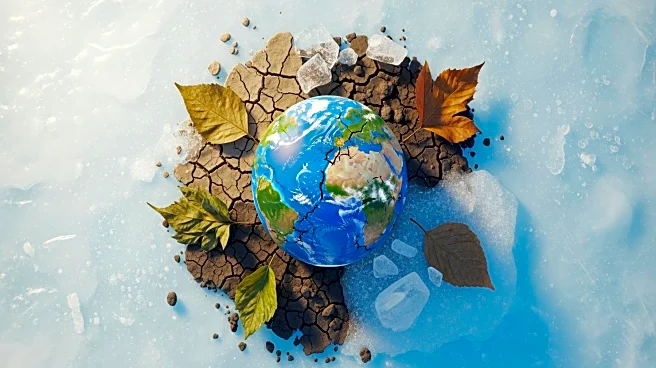What's Happening?
World leaders convened at the COP30 climate summit in Belém, Brazil, to discuss the escalating impacts of global warming. The summit, attended by politicians, diplomats, scientists, and business executives,
highlighted the severe consequences of climate change, including intense heat waves, floods, droughts, and hurricanes. Salah Jama, Deputy Prime Minister of Somalia, emphasized the crisis by noting the disappearance of forests and rising water levels, which are disrupting livelihoods worldwide. The summit comes amid another year of record heat and extreme weather, which scientists attribute to human-caused climate change.
Why It's Important?
The discussions at COP30 underscore the urgent need for global action to mitigate climate change. The severe weather events highlighted at the summit demonstrate the widespread impact on human lives, economies, and ecosystems. Countries like Spain, Namibia, and Haiti are experiencing devastating effects, including loss of life, food insecurity, and economic disruption. The summit aims to foster international cooperation and commitment to reducing greenhouse gas emissions and implementing sustainable practices. The outcomes of COP30 could influence future climate policies and international agreements, affecting global efforts to combat climate change.
What's Next?
The COP30 summit is expected to lead to new commitments and strategies for addressing climate change. Leaders may propose enhanced measures for reducing emissions and increasing resilience to climate impacts. The summit could also result in increased funding for climate adaptation and mitigation projects, particularly in vulnerable regions. Stakeholders, including governments and businesses, are likely to face pressure to implement sustainable practices and invest in renewable energy. The international community will be watching closely to see how the commitments made at COP30 translate into concrete actions.
Beyond the Headlines
The COP30 summit highlights the ethical responsibility of nations to address climate change, particularly in supporting vulnerable populations affected by its impacts. The discussions may lead to a reevaluation of global priorities, emphasizing the need for equitable solutions that consider the needs of developing countries. Long-term shifts in energy production, consumption patterns, and international cooperation could be triggered by the summit's outcomes, potentially reshaping global economic and environmental landscapes.








